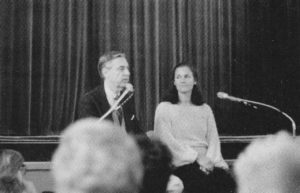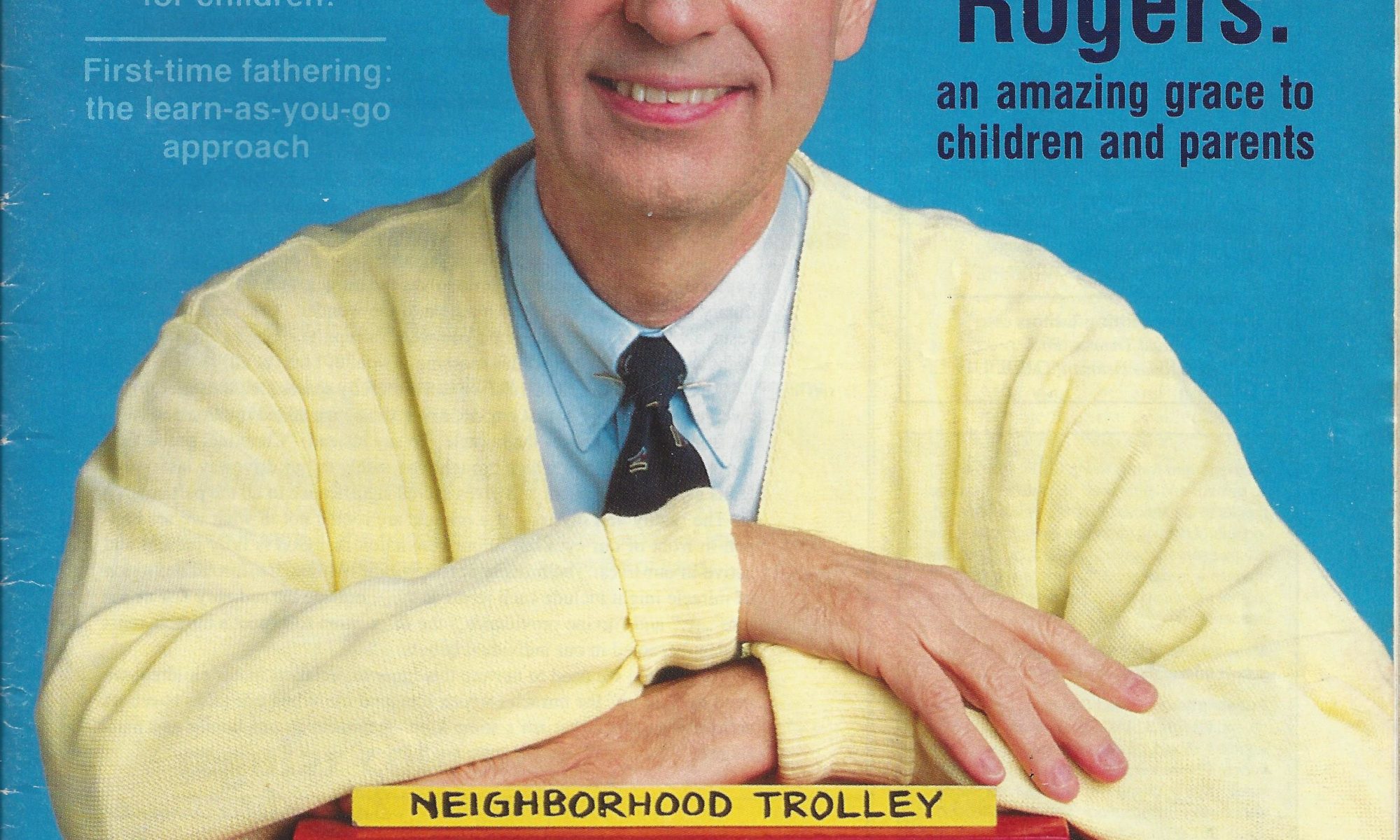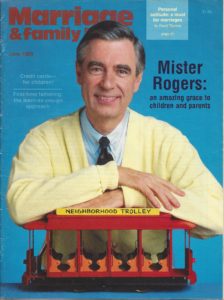The following article was published in the June 1988 issue of the Catholic journal Marriage & Family Living. Despite being Presbyterian, I became its first Media Editor after the parent company, Abbey Press, published my first book in 1976, Gadgets, Gimmicks, and Grace. This was one of the articles that was the source for my previously posted article in Fred Rogers memory, “Wasn’t It Nice in the Neighborhood?” There has been so much interest in the man, thanks to the new Tom Hanks film, that I decided to publish it again. I have one other article, also written for a Catholic magazine that I will post later. Writing about Mister Rogers was one of the great joys of my career.
“Fred Rogers has requested that no children be brought to his session later this week.” The audience in the huge amphitheater at Chautauqua Institution immediately was abuzz with questions and puzzled comments. What had happened to television’s pied piper? Mister Rogers was legendary for his love for young children, a love they returned in double measure. How could he issue such a decree? Had he been won over to the camp of W.C. Fields?
The explanation came quickly. “If there’s a child within five hundred feet of him, Fred Rogers will forget about the adults and relate only to the child. This time he really wants to talk with and answer questions from adults.”
We discovered during a memorable hour in a crowded opera hall that Mister Rogers can relate just as deeply with adults as he does with children. His advice, summed up by the plea for adults to listen more intently to the children around them, went far beyond the words he spoke safely from an elevated platform. In a totally unexpected way it was played out before us: several persons, with Fred’s encouragement, poured out to him some of their intense psychic pain and frustration.
Chautauqua Institution and Ms. Magazine had invited Fred Rogers to speak from the platform of Chautauqua’s huge amphitheater as a part of the conference on “American Families: The Changing State of Today’s Relationships.” Not liking large crowds, he had declined, so everyone tried to squeeze into the opera theater where Fred held forth from floor level, sitting on a stool and a mike in his hand. For many, it was their first live encounter with the Presbyterian minister who had touched the lives of their children so deeply through the medium of television and records.

Not liking speeches, Fred gave a few opening remarks and then asked for questions from the audience. There was no hesitancy on their part. Questions came at a fast clip. With undivided attention, Fred probed for further information from all questioners about their families. Only when he felt he understood something about them did he venture a reply.
Encouraged by his warm concern, two members of the audience offered more than questions. First a grandmother and later a young mother both with tears and choked voices, shared deep hurts in their families that cried out for more than a verbal answer. Fred left the stool and mike each time and walked to that person. He hugged her and spent a few minutes in private conversation with her. Here we saw the wisdom of having a moderator with Mister Rogers. During these moments she focused the attention of the concerned audience onto some of the issues they had raised earlier.
The hour passed too swiftly, and Dr. Dan Britton, Chautauqua’s president, announced that a large number of children were waiting outside to greet their hero. Some of the lucky ones in the institution’s day school had already met him that morning. Others were waiting on the lawn for their turn. When Mister Rogers appeared, a little boy on the other side of the lawn spotted him first. With a joyful cry and arms stretched out, the child raced away from his family and flung himself into the arms of his TV friend. He was rewarded with a long hug and a smile. All were aware that here was one adult who enjoyed being with a bunch of noisy children.
Fred Rogers’ television program incarnates the meaning of grace better than all religious TV shows put together. Appearing on public television, he does not use religious language, but every aspect of his show is built upon an understanding of a gracious God who accepts us as we are. From a few other personal encounters with Fred, I know the person matches the image, something all too rare in this TV -dominated, image-conscious society of ours, as the Iran-Contra affair and the ordeal of the Bakkers have reminded us.
The first time I went to his Pittsburgh-based Family Communications studio for a magazine interview, his assistant asked if I could wait a few minutes while Mister Rogers met a couple of his young fans. A grandmother had brought her out- of-town grandson and a friend to meet their favorite TV person. The two boys were tongue-tied in the awesome presence of the real Mister Rogers. Fred, knowing children well, had with him three puppets from his show. “That’s all right,” he said to the grandmother. “If they don’t want to talk, maybe these puppets can speak for us.” Within minutes the three puppets were “conversing” like longtime friends. Score one more for the indirect approach with children.
On another occasion when I was scheduled to interview him, Ellen, our teenage daughter, asked to go along, even though she’d miss a test at school. Fred Rogers spent the first twenty minutes getting to know her, inquiring about her interests and hopes. When she discovered that he, too, enjoyed origami-the art of Japanese paper folding-she promised to send him a pattern for a jumping frog that he could use in his class at a nearby prison. Later she received a note from him thanking her for the pattern and expressing the hope that she had no trouble making up her test.
Some time after that, two of our sons-not to be outdone by their older sister-asked if they could go along to meet him. He was busy taping a program but chatted with them and took time to get acquainted with my young companions. To their delight, we were all invited to take part as customers for a music store. While waiting for the crew to rearrange lights and props between shots, he graciously did the interview and posed for pictures with the boys. This time he sent a note thanking me for the interview and greeting the boys by name.
I mention these brief meetings to point out that Fred’s TV image is genuine. He really means it when he says or sings, “I like you just the way you are.” As Johnny Carson said to him, “You know, children can spot a phony.” And it’s true; this partially explains the Neighborhood’s long staying power on television. His image and reality are of the realm of grace. Theologians may write weighty tomes expounding on the various aspects of grace, but if I need help explaining grace to children or to my church schoolteachers, I say “Watch and listen to Mister Rogers.”
He means it when he looks into the camera and builds up his young viewer-singular because he thinks and writes for the individual child, not for TV’s usual mass audience.
Much of today’s communication between adults and children is in the imperative. “Stop that! Pick up your clothes! Eat your food! Don’t do that! Shut up! Speak up! Get moving! Go to bed!” Even in church, the house of grace, it’s “Be quiet! Sit still! Stay in line! You can’t do that here! Quit giggling! Don’t laugh! Walk, don’t skip! You’re not supposed to do that during worship!” And this communication too often comes from three or four feet above their heads. In a world where children often feel they are acceptable only if they measure up to adult demands and expectations, the hour spent with Mister Rogers is a refreshing change (like that between law and grace). No one will laugh at them in Mister Rogers’ neighborhood because they can’t tie their shoes very well or they spill their milk. This TV troubadour takes even their fears seriously. Who else has written a song assuring toddlers they won’t go down the drain if they fall into the toilet?
Neither does Mister Rogers talk down to his viewers in that awful sing-songy way that so many hosts of “kiddy shows” think is necessary. His viewers may be children, but he treats them with respect and encourages in them the incredible potential he knows is there. And do they ever respond to such gracious treatment with marvelous trust! Even children meeting him for the first time will often pour out to him their secrets and dreams. This was true, as well, for those adults gathered at the Chautauqua meeting hall. Not only did the two women reveal at great risk in front of their peers, their deeply felt hurts, but also many others in the audience prefaced their questions with greetings and messages of love from their college-age or grown sons and daughters.
So every weekday this pied piper of the airwaves graces millions of young viewers. After a day of put-downs from a too often ungracious world, the child-and the fortunate parent who peeks in-is assured that he or she is indeed a person of great worth. Grace abounds in Mister Rogers’ Neighborhood without resorting to religious language or waving the Bible around. Mister Rogers has done his Bible homework with years of study at Pittsburgh Theological Seminary. Pittsburgh Presbytery knew, too, what it was doing when it issued to him a special ordination to television ministry, a ministry totally different from the so-called electronic church. It is one where grace is not just preached about but is incarnated.
If we’re afraid our children will not see the grace in Mister Rogers’ Neighborhood, then it’s up to us to help them name it, when as we should
be doing for adults in such “nonreligious” works as Places in the Heart, Hoosiers, or Salvador. This isn’t accomplished in heavy-handed manner
that will get in the way of their enjoyment. We may be surprised to find out that the children already know this. Although some adults may enjoy
parodying their hero, children are still intuitively drawn by his graciousness. They can spot a phony. In Mister Rogers they find the genuine article,
who, like his Master Teacher, knows that the kingdom of God is for children who can laugh, sing, skip, and see moments of grace in the fluttering of a butterfly’s wing, the song of a bird, or the smiling face and outstretched hands of a neighbor. Occasionally every parent and every teacher should watch Mister Rogers’ Neighborhood if they are concerned about children and God’s call to a grace-filled life .•
Edward McNulty and his wife, Sandra, are the parents
of five children. He is a parish pastor and the author of
three books; he reviews films, TV, and records for
Marriage & family living and writes media guides for
several other publications.
Addendum
Fred McFeely Rogers has been reassuring children that they are persons of great worth for over twenty years on public television.
Somewhere during daylight hours one of the more than six hundred episodes of Mister Rogers’ Neighborhood is playing each hour of the day.
Fred Rogers, a native of Latrobe, Pennsylvania, majored in music composition in college. In the early fifties while he worked at NBC in New York he married Joanne Byrd, a concert pianist and college classmate. In 1953, the nation’s first community-supported public television station WQED invited him to come to Pittsburgh and help develop their programming. The Children‘s Corner, an hour-long program, featured Fred’s puppets but he was not the show’s host. Later he emerged from behind the camera and developed the series that became Mister Rogers‘ Neighborhood. He adds several new episodes a year.
Fred and Joanne have two sons, James, 27, and John, 25, who live in the Pittsburgh area. James works in a technical photo lab in a hospital, and John is in real estate. By mutual agreement, Fred’s family has not shared his limelight. The boys appeared on the Neighborhood a time or two years ago. Joanne plays occasional concerts but under her own name not Mrs. Fred Rogers. Fred said, “One person in television is enough,” and the family agrees.


